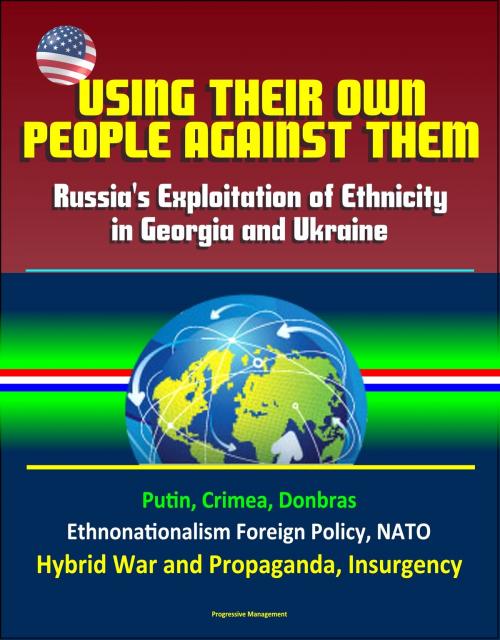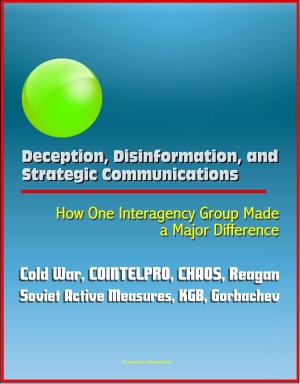Using Their Own People Against Them: Russia's Exploitation of Ethnicity in Georgia and Ukraine - Putin, Crimea, Donbras, Ethnonationalism Foreign Policy, NATO, Hybrid War and Propaganda, Insurgency
Nonfiction, History, Baltic States, Asian, Russia| Author: | Progressive Management | ISBN: | 9781370736140 |
| Publisher: | Progressive Management | Publication: | November 28, 2016 |
| Imprint: | Smashwords Edition | Language: | English |
| Author: | Progressive Management |
| ISBN: | 9781370736140 |
| Publisher: | Progressive Management |
| Publication: | November 28, 2016 |
| Imprint: | Smashwords Edition |
| Language: | English |
This excellent report has been professionally converted for accurate flowing-text e-book format reproduction. Russia consistently exploits ethnic divides in its foreign policy strategy, specifically against states in its "near abroad." Georgia and Ukraine have been on the receiving end of this strategy for most of their post-Soviet history. As a result, the sovereignty of both has been systematically and repeatedly violated by Russia. A comparative study of Georgia and Ukraine, two countries that share a unique historical relationship with Russia but are now ideologically moving outside its orbit, permits a more nuanced view into two distinctive aspects of Russia's exploitation of ethnic divisions: Georgia as an ancient and unique nation located in the crossroads of three continents, and Ukraine as a fellow Slavic country with a shared Russian history fighting to create its own identity. Russia's efforts to exploit ethnic divides fall into six categories: exporting propaganda, manipulating identity, arming insurgents, supplying fighters, exploiting presence, and freezing conflicts. Though Russia has successfully weakened Georgia and Ukraine through these six strategic methods, Russia has struggled to achieve its long-term goals of limiting Western influence, creating a Russian hegemony, and restoring Russia to great-power status. In pursuing these goals, Russia not only irreparably damaged ethnic relationships in Georgia and Ukraine, but also severely tarnished its international reputation.
CHAPTER I - INTRODUCTION * A. RESEARCH FOCUS: THE EXPLOITATION PREMISE * B. A COMPARATIVE STUDY OF RUSSIA'S EXPLOITATION OF ETHNIC DIVISION IN GEORGIA AND UKRAINE * C. LITERATURE REVIEW: CONTEXT OF DIVIDED NATIONS * 1. Georgian and Ukrainian Cases: Historical and Ethnic Background * 2. Ethnicity, Ethnic Division, and Ethnic Conflict Theory * 3. Russian Foreign Policy Goals * D. HYPOTHESES: RUSSIA'S STRATEGIC METHODS * 1. Exporting Propaganda * 2. Manipulating Identity * 3. Arming Insurgents * 4. Supplying Fighters * 5. Exploiting Presence * 6. Freezing Conflicts. * E. RESEARCH DESIGN: CASE-BY-CASE, METHOD TO OBJECTIVE * F. A NOTE ON PROPER NOUNS AND SPELLINGS * CHAPTER II - GEORGIAN CASE: NEITHER NUANCED NOR NORMATIVE * A. BACKGROUND: CROSSROADS OF CIVILIZATION * B. PHASE ONE: THE SOUTH OSSETIAN AND ABKHAZIAN WARS * 1. Early Conflict: South Ossetia War and the Invasion of Abkhazia * 2. Support Mustered in Moscow * 3. Arms and Volunteers * 4. The War's Aftermath * C. PHASE TWO: PEACEKEEPING IN A FROZEN CONFLICT * D. PHASE THREE: COERCIVE WARMONGERING * 1. The Alignment Pretext * 2. Military Alliances and Aid * 3. Coercive Diplomacy * 4. 2008 Russo-Georgian War * E. PHASE FOUR: WITH RUSSIA OR ALONE? * F. CONCLUSION * CHAPTER III - UKRAINIAN CASE: NATO MADE ME DO IT * A. BACKGROUND: A NEW NATION * 1. Russia's Neighborhood Policy, Ethnonationalism, and Novorossiya * 2. A Blended State and its Impact on Propaganda * B. PHASE ONE: THE YANUKOVYCH FAMILY'S REIGN * C. PHASE TWO: THE SECOND CRIMEAN WAR AND THE LITTLE GREEN MEN WHO WON IT * D. PHASE THREE: BOMBAST IN THE DONBAS * E. CONCLUSION * 1. Minsk II and Beyond * 2. Ethnic Conflict, Insurgency, or Hybrid War? * 3. A Successful Gambit? * CHAPTER IV - CONCLUSION: STRATEGIC APTITUDE OR MISGUIDED INEPTITUDE * A. EFFECTIVENESS OF THE STRATEGIC OBJECTIVES * 1. Exporting Propaganda * 2. Manipulating Identity * 3. Arming Insurgents * 4. Supplying Fighters * 5. Exploiting Presence * 6. Freezing Conflicts * B. OVERALL ASSESSMENT * C. POLICY RECOMMENDATIONS * 1. For Western Policymakers * 2. For Georgian and Ukrainian Policymakers * D. FINAL THOUGHTS
This excellent report has been professionally converted for accurate flowing-text e-book format reproduction. Russia consistently exploits ethnic divides in its foreign policy strategy, specifically against states in its "near abroad." Georgia and Ukraine have been on the receiving end of this strategy for most of their post-Soviet history. As a result, the sovereignty of both has been systematically and repeatedly violated by Russia. A comparative study of Georgia and Ukraine, two countries that share a unique historical relationship with Russia but are now ideologically moving outside its orbit, permits a more nuanced view into two distinctive aspects of Russia's exploitation of ethnic divisions: Georgia as an ancient and unique nation located in the crossroads of three continents, and Ukraine as a fellow Slavic country with a shared Russian history fighting to create its own identity. Russia's efforts to exploit ethnic divides fall into six categories: exporting propaganda, manipulating identity, arming insurgents, supplying fighters, exploiting presence, and freezing conflicts. Though Russia has successfully weakened Georgia and Ukraine through these six strategic methods, Russia has struggled to achieve its long-term goals of limiting Western influence, creating a Russian hegemony, and restoring Russia to great-power status. In pursuing these goals, Russia not only irreparably damaged ethnic relationships in Georgia and Ukraine, but also severely tarnished its international reputation.
CHAPTER I - INTRODUCTION * A. RESEARCH FOCUS: THE EXPLOITATION PREMISE * B. A COMPARATIVE STUDY OF RUSSIA'S EXPLOITATION OF ETHNIC DIVISION IN GEORGIA AND UKRAINE * C. LITERATURE REVIEW: CONTEXT OF DIVIDED NATIONS * 1. Georgian and Ukrainian Cases: Historical and Ethnic Background * 2. Ethnicity, Ethnic Division, and Ethnic Conflict Theory * 3. Russian Foreign Policy Goals * D. HYPOTHESES: RUSSIA'S STRATEGIC METHODS * 1. Exporting Propaganda * 2. Manipulating Identity * 3. Arming Insurgents * 4. Supplying Fighters * 5. Exploiting Presence * 6. Freezing Conflicts. * E. RESEARCH DESIGN: CASE-BY-CASE, METHOD TO OBJECTIVE * F. A NOTE ON PROPER NOUNS AND SPELLINGS * CHAPTER II - GEORGIAN CASE: NEITHER NUANCED NOR NORMATIVE * A. BACKGROUND: CROSSROADS OF CIVILIZATION * B. PHASE ONE: THE SOUTH OSSETIAN AND ABKHAZIAN WARS * 1. Early Conflict: South Ossetia War and the Invasion of Abkhazia * 2. Support Mustered in Moscow * 3. Arms and Volunteers * 4. The War's Aftermath * C. PHASE TWO: PEACEKEEPING IN A FROZEN CONFLICT * D. PHASE THREE: COERCIVE WARMONGERING * 1. The Alignment Pretext * 2. Military Alliances and Aid * 3. Coercive Diplomacy * 4. 2008 Russo-Georgian War * E. PHASE FOUR: WITH RUSSIA OR ALONE? * F. CONCLUSION * CHAPTER III - UKRAINIAN CASE: NATO MADE ME DO IT * A. BACKGROUND: A NEW NATION * 1. Russia's Neighborhood Policy, Ethnonationalism, and Novorossiya * 2. A Blended State and its Impact on Propaganda * B. PHASE ONE: THE YANUKOVYCH FAMILY'S REIGN * C. PHASE TWO: THE SECOND CRIMEAN WAR AND THE LITTLE GREEN MEN WHO WON IT * D. PHASE THREE: BOMBAST IN THE DONBAS * E. CONCLUSION * 1. Minsk II and Beyond * 2. Ethnic Conflict, Insurgency, or Hybrid War? * 3. A Successful Gambit? * CHAPTER IV - CONCLUSION: STRATEGIC APTITUDE OR MISGUIDED INEPTITUDE * A. EFFECTIVENESS OF THE STRATEGIC OBJECTIVES * 1. Exporting Propaganda * 2. Manipulating Identity * 3. Arming Insurgents * 4. Supplying Fighters * 5. Exploiting Presence * 6. Freezing Conflicts * B. OVERALL ASSESSMENT * C. POLICY RECOMMENDATIONS * 1. For Western Policymakers * 2. For Georgian and Ukrainian Policymakers * D. FINAL THOUGHTS















